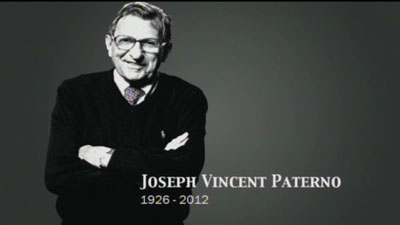Archives
Jan. 30, 2012
Joe Paterno has passed away.
I knew that I’d have to say those terrible words someday, as much as I didn’t want to admit it. Paterno was nearly 60 years old when my dad took me to my first Penn State football game, a homecoming victory over Syracuse during the Nittany Lions’ 1986 championship season. By the time I graduated, Paterno was approaching 70. And even in recent years, as he continued to coach well into his 80s, JoePa still seemed as timeless and permanent as Mount Nittany.
However, less than three months after he had been diagnosed with lung cancer, Joe Paterno died on Jan. 22, 2012, at the age of 85.

I heard the news while staying at Joan’s dad’s house for their family’s annual post-Christmas gathering. Late Saturday night, we were shaken by reports of his passing that turned out to be false. But our relief didn’t last long; the following morning, ESPN began extended coverage of the news that Joe Paterno had indeed died of complications from cancer. It was hardly a surprise by then, but I still cried for a few minutes, knowing we’d never see our beloved coach again.
Last month, when I wrote at length about the horrific Jerry Sandusky scandal and its enormous fallout at my alma mater, I found it unsettling to write about Joe Paterno in the past tense. My description of his impact on Penn State was, essentially, an obituary of his legendary career. But I had hoped that he would eventually have an opportunity to tell his side of the story regarding the scandal, and didn’t expect that his health would fail so quickly. But I can take some solace in the fact that Joe left this earth surrounded by his family and was spared from months of unbearable pain.
In the days that followed his death, I was comforted to see so many warm tributes to Joe’s life, both on campus and in the national media. It’s impossible to ignore the terrible way in which his coaching career ended, and again, even Joe admitted that he should have done more to follow up on the allegations of Sandusky’s behavior. But still, the majority of news stories were deeply respectful and focused on his many generous contributions to the Penn State community over the course of six decades.
* * * * *
I met Joe Paterno in person only once, in the spring of 1995. My dad, also a Penn State graduate, brought me as a guest to a PSU alumni event in the King of Prussia area, if I recall correctly. I’d just completed my junior year, and I was very excited at the opportunity to meet such a living legend.
During our brief conversation, Joe asked me where I was from. I replied, “West Chester.”
“Oh, that’s great!” he said. “West Chester is a really fine university.”
I sheepishly responded, “Oh, I’m sorry — I live in West Chester, but I’m actually a junior at Penn State, on main campus.”
Joe’s eyes opened wide behind his thick glasses as he smiled. “Oh, you should have told me! What are you majoring in? How are your grades?” We exchanged a few more words and had our photos taken with him, and I was deeply impressed that he took such an interest in me and my studies, if only for a few minutes. (And just recently, I learned that my good friend Tony had a very similar experience during the time he’d met Joe near Pattee Library that same year.)
* * * * *
I could write 100 more paragraphs about Joe Paterno and what he has meant to me and my fellow Penn Staters over the years. But I’ll close with a poignant excerpt from Jack McCallum’s column in Sports Illustrated from Jan. 22:
Behind the statue is a plaque on which Paterno is quoted: “They ask me what I’d like written about me when I’m gone. I hope they write I made Penn State a better place, not just that I was a good football coach.” He wrote his own epitaph.
Penn State is indeed a far better place, thanks to the hard work, dedication, and loyalty of Joseph Vincent Paterno.
Goodbye, Joe, and thank you for everything you’ve done for us.
[ No. 619 ]
